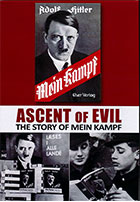
Ascent of Evil: The Story of Mein Kampf 2016
Distributed by epf media, 324 S. Beverly Drive, PMB 437, Beverly Hills, CA 90212; 310-839-1500
Produced by Nicolas Valode
Directed by Frederic Monteil
DVD, color, 58 min.
Middle School - General Adult
Adolf Hitler, Germany, World War II
Date Entered: 10/23/2017
Reviewed by Christopher Lewis, American University Library, American UniversityIf you are reading this review, you are probably familiar with at least the title Mein Kampf (My Struggle), Adolf Hitler’s anti-Semitic book written while in prison before his ascent to Fuhrer. But have you read it? By some accounts, it is almost unreadable, a hodge-podge of ideas, poorly written, and dense. Yet if the millions who once owned this widely distributed screed had actually read it they would have been alerted to the diabolical plan of conquest and annihilation that Hitler went on to carry out fifteen years later. This video addresses the bizarre irony that the book, which sat alongside the bible in many German homes, was so lightly read that it came as a shock when Hitler executed what he had presaged in his younger years.
Following WWI, Hitler did not accept defeat. He stayed in the army and became a spy on the German Workers Party. As he got involved with extremist politics, he discovered a talent for public speaking and the ability to incite thousands. In 1923, he and others planned a march on Munich to disrupt a Bavarian government meeting, what became known as the Beer Hall Putsch. The protest failed and Hitler was arrested and found guilty of treason. He then served nine months of a five year sentence in Landsburg Prison where he was treated like a celebrity, receiving fan mail, and attracting a gathering of followers. He also read books on racial superiority and blended their ideas with his own political beliefs in the writing that became Mein Kampf. In the book he was obsessed with Jews, describing them as a virus. He also identified France as a degenerate symbol of race-mixing. Once released from prison, another extremist, Max Armand, published the book though initially it was not a success.
In 1930, as the Depression set in worldwide, extremists get a foothold in Germany and Mein Kampf started selling. In 1933 Hitler was elected Chancellor and Mein Kampf became an element of the Nazi propaganda campaign. By 1936, it was given to all newlyweds as a gift from the state. Krups and other manufacturers, who benefitted from Hitler’s rise, handed it out to their employees as a bonus or birthday gift. There was a braille version, a deluxe coffee table version, and even a bible format version.
However the filmmaker contends it was not actually read widely and among the more sophisticated Hitler was considered a joke and someone who could not remain in power for long. Indeed Hitler feared it being read too closely especially regarding his beliefs about France. He refused to authorize a translation into French and when confronted by a French journalist in 1933, Hitler lied and said he had changed and only wanted peace. Nevertheless it was secretly translated and published in France in 1934 and distributed to 5000 former soldiers with a warning that another world war was coming. Hitler took the publisher to court and won. The French elite hadn’t taken it seriously anyway believing it to be too violent to be real.
Then the dominoes began to fall. Hitler annexed Czechoslovakia in violation of the Versailles Treaty and France, England, and others, signed the ill-advised Munich Agreement acknowledging the annexation in an act of appeasement. But in 1939, Hitler broke the agreement when Germany waged war against Poland and it became obvious that Mein Kampf was no joke. Soon the book had a new life as a counter-propaganda tool used in the United States to rouse isolationists to action.
When the war ended, the 12 million copies of Mein Kampf became a liability and many were burned, buried, or thrown in the river as quickly as possible. It was soon forbidden to be published in Germany and other countries.
But it has been revived. A Turkish edition was a #1 seller in 2005 and in India, Hitler is recognized for his management success. In 2016 the book became public domain though Germany only sells critical editions.
In summary, the video is excellent and highly recommended for all libraries. The singular focus on where the book exists in the broader story of Hitler’s Germany provides not only a compelling new chapter on this devastating era but also echoes today in the era of “fake news” and social media propaganda.